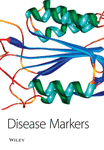The Catalase –262C/T Promoter Polymorphism and Diabetic Complications in Caucasians with Type 2 Diabetes
Abstract
Catalase is a central antioxidant enzyme constituting the primary defense against oxidative stress. In this study, we investigated whether the functional –262C/T polymorphism in the promoter of catalase gene is associated with the presence of diabetic retinopathy (DR), diabetic nephropathy (DN) and ischemic heart disease (IHD) in 520 Caucasian-Brazilians with type 2 diabetes. The –262C/T polymorphism was also examined in 100 Caucasian blood donors. Patients underwent a clinical and laboratory evaluation consisting of a questionnaire, physical examination, assessment of diabetic complications and laboratory tests. Genotype analysis was performed using the polymerase chain reaction followed by digestion with restriction enzyme. The genotype and allele frequencies of the –262C/T polymorphism in patients with type 2 diabetes were very similar to those of blood donors (T allele frequency = 0.20 and 0.18, respectively). Likewise, there were no differences in either genotype or allele frequencies between type 2 diabetic patients with or without DR, DN or IHD. Thus, our results do not support the hypothesis that the –262C/T polymorphism is related to the development of DR, DN or IHD in patients with type 2 diabetes. Further studies are necessary to elucidate the role of catalase gene polymorphisms in the pathogenesis of diabetic complications.




